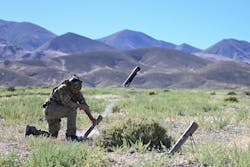Army asks AeroVironment for more Switchblade armed uncrewed anti-tank aircraft that act like smart mortars
REDSTONE ARSENAL, Ala. – U.S. Army fire support experts are asking AeroVironment Inc. in Simi Valley, Calif., to build manpackable armed uncrewed aircraft to attack enemy tanks, light armored vehicles, hardened targets, and warfighters under terms of a $54.9 million order announced in September.
Officials of the U.S. Army Contracting Command at Redstone Arsenal, Ala., are asking AeroVironment to build the Switchblade armed loitering unmanned aerial vehicle (UAV) that launches from a small tube that can be carried in a warfighter's backpack.
The Switchblade attack drone system, which essentially functions as a smart mortar round, transmits live color and infrared video wirelessly after launch for display on a small ground-control unit. The operator confirms the target using the live video feed, commands the air vehicle to arm its payload and lock its trajectory onto the target.
AeroVironment won a $990 million Switchblade production contract in last August.
The Switchblade anti-personnel UAV weapon reportedly has been successful in Ukraine against Russian light combat vehicles and other valuable targets of opportunity. Ukraine officially uses the Switchblade 300 attack drone.
The most advanced version of the AeroVironment anti-tank system is the Switchblade 600, which can fly for 40 miles or 40 minutes, weighs 33 pounds, and can loiter near targets at speeds of 70 miles per hour.
Controllers can manipulate the Switchblade loitering munition from as far away as 6.2 miles. It can engage long-range targets and help to relieve warfighters who are pinned down by enemy fire.
The Switchblade uses compressed air to shoot out of its launch tube, and has an electric engine for propulsion. The loitering munition uses a fly-by-radio frequency signal, and daylight and infrared cameras to lock on to stationary and moving targets.
The warhead has a forward-firing shotgun-blast effect that throws pellets forward of the missile. The missile weighs six pounds, and is for use against beyond-line-of-site targets. It can provide real-time GPS coordinates and video for information gathering, targeting, or target recognition.
The Switchblade warhead has an explosive charge equivalent to a 40-millimeter grenade that is able to destroy light armored vehicles, enemy infantry, and supplies.
The Switchblade killer drone operates with a common ground-control station; flies at speeds of 55 to 85 knots, at altitudes below 500 feet; and can launch from the ground, from aircraft, from ground vehicles, and from surface vessels.
On this contract AeroVironment will do the work at locations to be determined with each order, and should be finished in August 2029. For more information contact AeroVironment online at www.avinc.com/lms/switchblade-600, or the Army Contracting Command-Aberdeen Proving Ground at https://acc.army.mil/contractingcenters/acc-apg/.
About the Author
John Keller
Editor-in-Chief
John Keller is the Editor-in-Chief, Military & Aerospace Electronics Magazine--provides extensive coverage and analysis of enabling electronics and optoelectronic technologies in military, space and commercial aviation applications. John has been a member of the Military & Aerospace Electronics staff since 1989 and chief editor since 1995.
